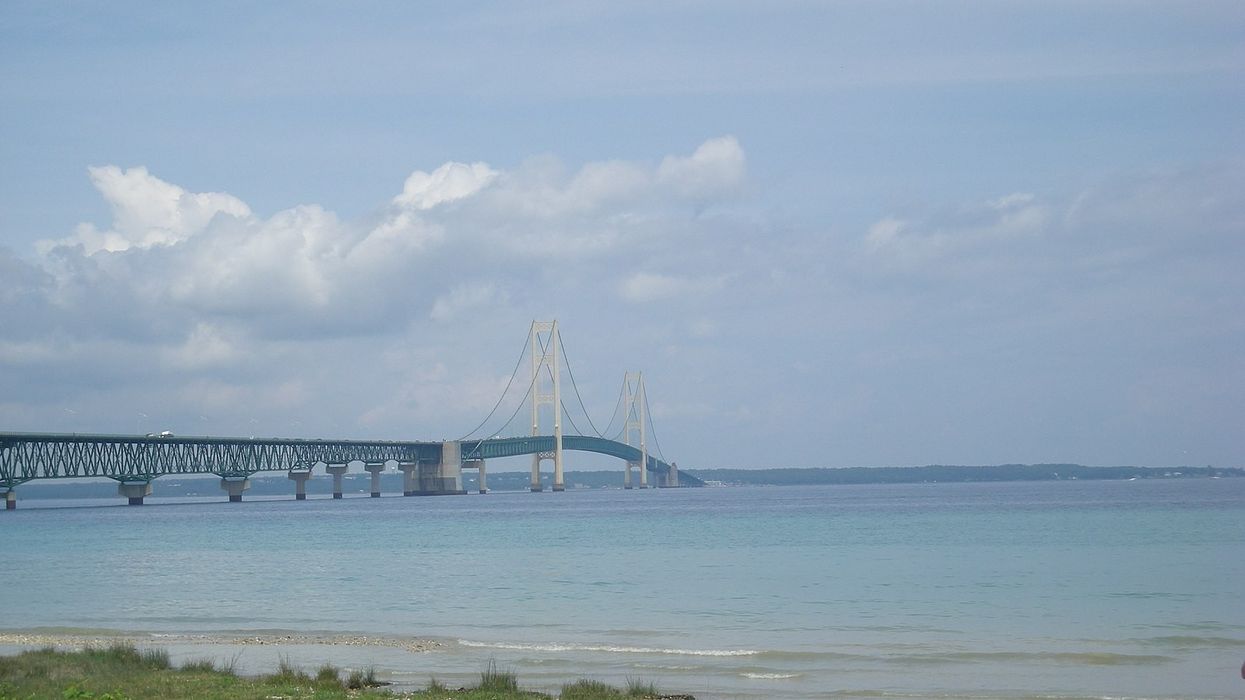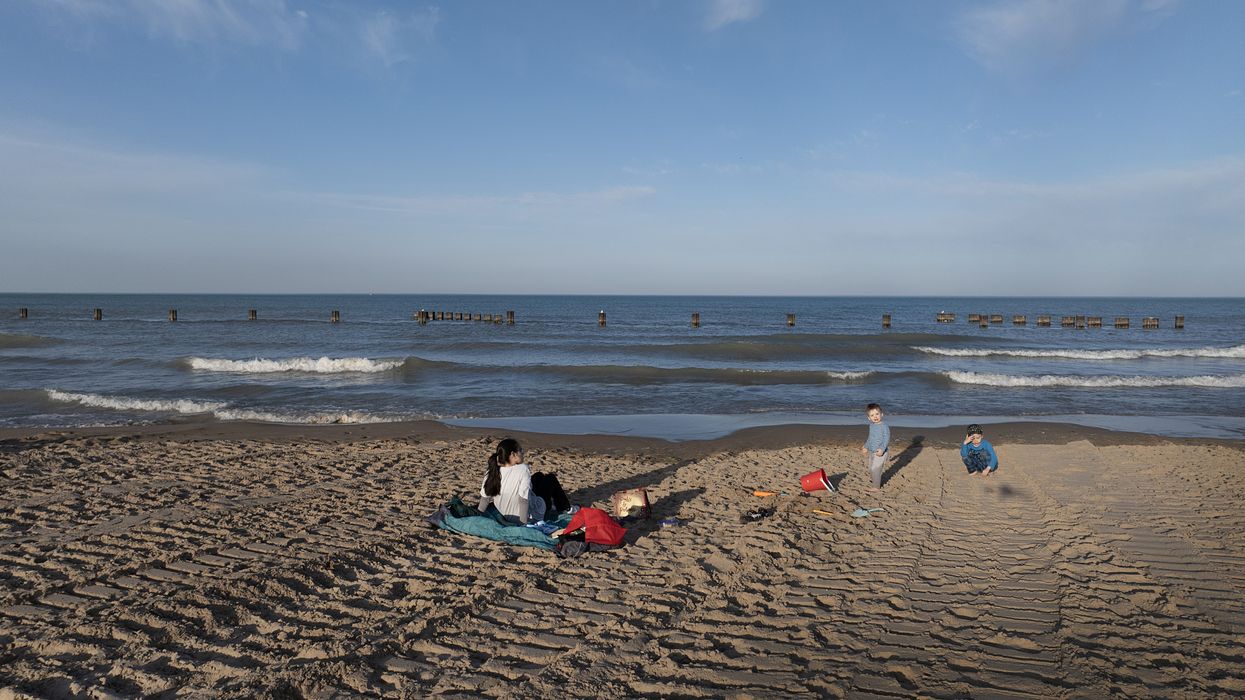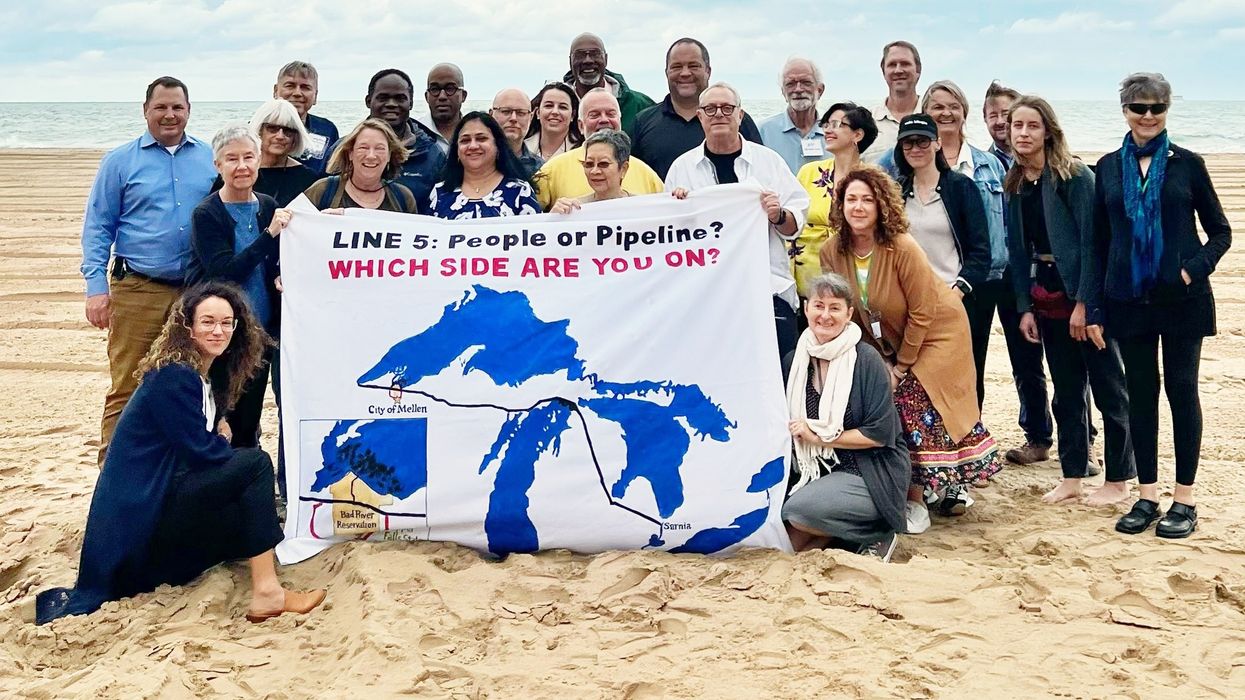If Harris Wants to Win Over Young Voters in Swing States, She’ll Say No to Line 5
America’s most dangerous crude oil pipeline threatens the future of the Great Lakes. That’s why young voters want it shut down.
Picture this: shimmery sunlight dancing on water. Deep blue crests over seafoam green before dissipating as waves meet the shore. The Chicago skyline gazes from a distance.
Running along Lake Michigan is one of my favorite pastimes at Northwestern University. We pride ourselves on having not one, but two beaches on campus that showcase the lake. The body of water is so wide it feels more like an ocean. The sound of the waves crashing onto the sand reminds me of the beaches back home in the San Francisco Bay Area.
But in the heart of the Great Lakes—where Lake Michigan meets Lake Huron—America’s most dangerous crude oil pipeline threatens 700 miles of coastline and our climate future.
By incorporating pipeline shutdowns in her climate platform, Harris can send a clear message that our future doesn’t rely on fossil fuels and that people can raise their families and thrive in the Great Lakes region.
Growing up in the Bay Area showed me that addressing the climate crisis is my generation’s mission. When I was a junior in high school in 2020, California experienced the worst wildfire in state history. Orange haze blanketed everything. With the air quality index skyrocketing, I did not dare go outside. Friends had to evacuate their homes, and a teacher of mine saw their house burn down. I knew I wanted a career focused on the environment when I realized our wildfires would grow worse every year without action.
Coming here for college, I was excited to explore a new part of the country and catch a break from the wildfire season. People tout the Midwest as a haven from the climate crisis, but environmental issues are aplenty here as well.
As the presidential election date gets closer with states in the Midwest crucial for the Harris-Walz ticket to pick up, looming threats to our Great Lakes should gain wider attention, all because of North America’s most dangerous fossil fuel pipeline. The Great Lakes hold one-fifth of the world’s available fresh water supply, but under it lurks an oil pipeline called Line 5, operated by Canadian oil corporation Enbridge, which could ruin millions of people’s drinking water, mar Lake Michigan’s beauty, and devastate our communities.
Right in the heart of the Great Lakes, the Line 5 oil pipeline is accelerating our climate crisis as we speak. Seventy-one years ago, Enbridge built Line 5 right through Michigan and Wisconsin and in some of the most sensitive areas in the Great Lakes as a shortcut to reach Ontario, Canada. A spill from Line 5 could reach the Lake Michigan shoreline where myself and hundreds of thousands of people live and walk by everyday.
Enbridge has a sordid history when it comes to pipeline infrastructure. They are responsible for one of the largest inland oil spills in United States history from another pipeline they operate in Michigan. They didn’t shut the valve for 17 hours, and remediation efforts took five years. A similar spill from Line 5 would significantly threaten the Great Lakes and the people who call this region home. When burned, the oil in Line 5 contributes more greenhouse gas emissions than the three most polluting coal-fired power plants in the country combined
With a major election this year, young voters across Michigan, Wisconsin, Illinois, and Minnesota will be a crucial voting bloc. For many of us—myself included—it’s going to be our first time voting in a presidential election. Taking action for the environment is at the forefront of my generation’s concerns, which means that delivering a tangible victory to protect our climate and Great Lakes is absolutely necessary. Enbridge’s Line 5 must be shut down and decommissioned. While a Harris-Walz administration can deliver by making this action happen, U.S. President Joe Biden can do so now by revoking this outdated pipeline’s permit.
The Great Lakes aren’t just the source of drinking water for over 40 million people. They’re our identity, creating a major reason why many of us live in the Midwest to begin with. When governments are putting more energy toward keeping fossil fuel pipelines in the Great Lakes than preserving the water we drink from, swim in, and fish from, it gives the impression that our natural resources aren’t worth saving. We cannot afford to be complacent in a time of crisis, and we must do better.
Indigenous Tribes, environmental groups, small businesses, and local residents across the Great Lakes have been fighting Enbridge’s Line 5 for over a decade because of the severe risks it poses to our air, land, water, and health. Enbridge has been operating illegally in Michigan since Gov. Gretchen Whitmer took action to stop the pipeline in 2020. And since 2012, Enbridge has been trespassing on the Bad River Band’s reservation in Wisconsin.
People are taking action against Line 5 by signing petitions, attending rallies in the U.S. and Canada, writing to their legislators, and emailing administration officials like U.S. Secretary of Transportation Pete Buttigieg for a shutdown. Volunteers have organized local businesses, faith communities, and Native Nations to attend teach-ins and community events and share information on Line 5’s dangers.
With Vice President Kamala Harris at the top of the ticket now, shutting down Line 5 should be a key issue in her policy platform. Gov. Whitmer won reelection handily after calling for a shutdown order, which shows that moving away from fossil fuels and decommissioning unsafe pipelines can be a winning electoral issue. Prioritizing a Line 5 shutdown could show that Harris can be one of the most pro-environment presidents in American history—her track record from California and her time in the Senate suggests that she prioritizes environmental policies like this. Shutting down the pipeline can set the stage for a new climate champion government.
A Line 5 shutdown is an achievable, easy win with real advantages. If climate is on the agenda for young voters in key Midwest states, Line 5 should be on the list of the vice president’s campaign priorities. By incorporating pipeline shutdowns in her climate platform, Harris can send a clear message that our future doesn’t rely on fossil fuels and that people can raise their families and thrive in the Great Lakes region. Young voters from the Midwest, like me, are firmly uniting behind one key message: Shut down Line 5.


